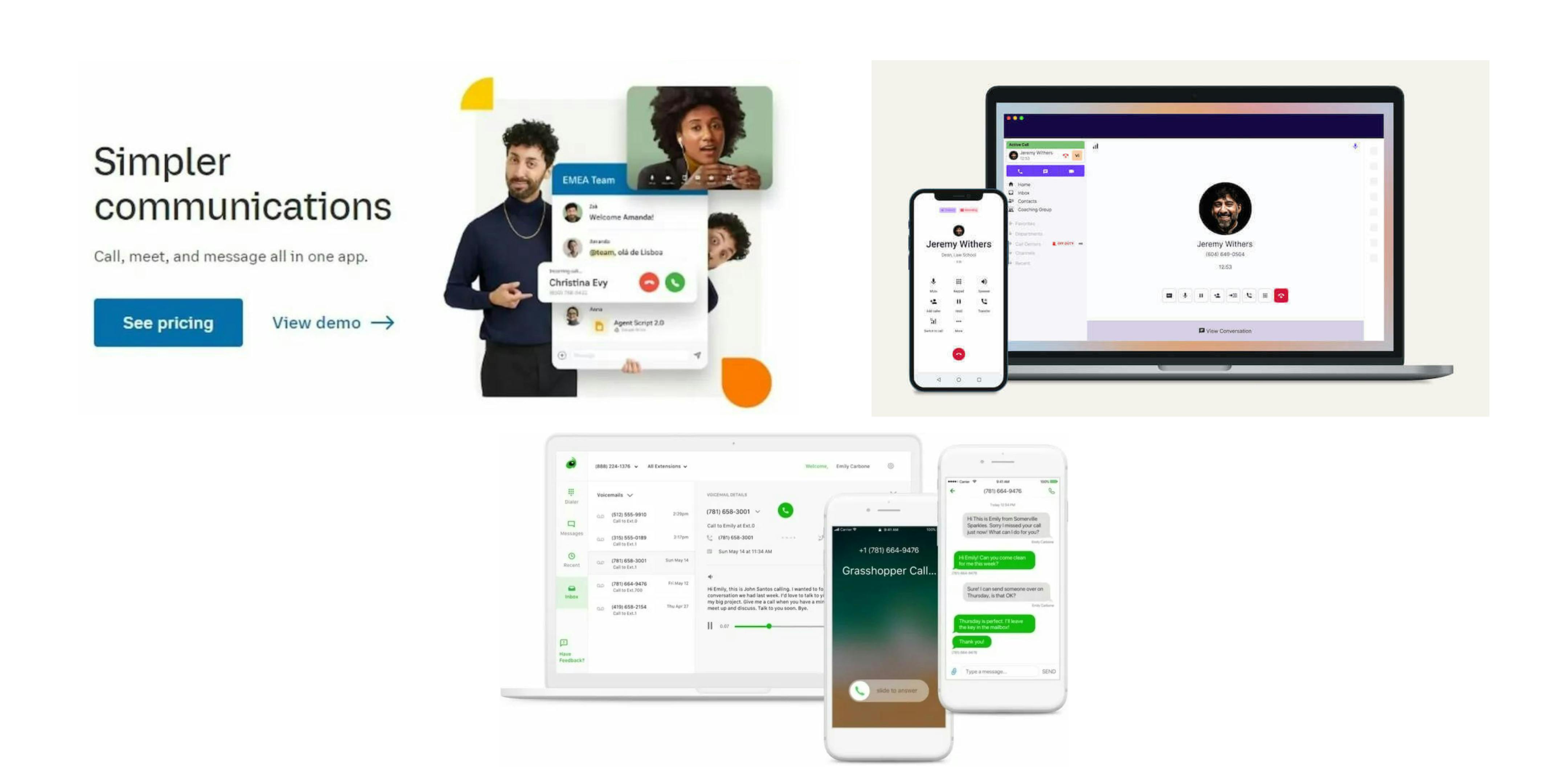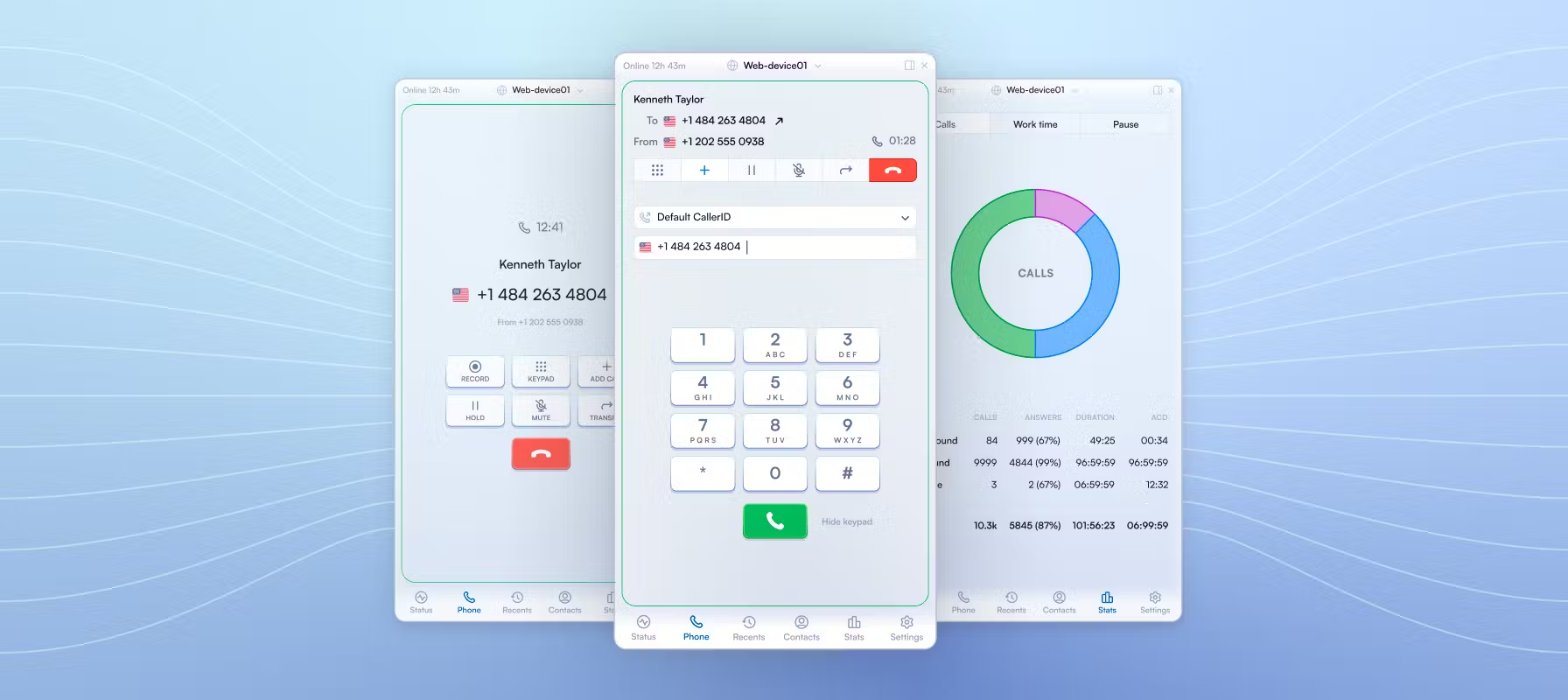Softphone applications are versatile and robust VoIP tools that facilitate two-way communication via the Internet, seamlessly operating on both Windows and Mac platforms. These applications boast all the functionalities of traditional telephones, allowing users to make and receive calls, transfer calls, access call history and voicemail, all while significantly reducing costs.
Gone are the days of relying on landline terminals for dialing numbers. The need for hardware maintenance, physical phonebooks, traditional phone lines, and the inconvenience of occupied hands during crucial note-taking moments during calls are things of the past.
Softphone applications redefine the way we think about communication, blending cost-efficiency with unparalleled flexibility. They stand out as superior alternatives to traditional phone systems, thanks to their advanced features, scalability, and seamless integration with today's digital infrastructures.
At BinarCode, we are currently working on a Cloud-based, VoIP solution that can help small and medium entrepreneurs boost their businesses.
Let's see how:
1. Economic advantages
- Cost reduction: By eliminating the need for physical hardware, softphone apps drastically cut down on expenses related to installation, maintenance, and operation.
- Operational efficiency: Deployment times are shortened, new employee adaptation is accelerated, system recovery is enhanced, and operational downtimes are minimized.
- Remote work facilitation: The ability to use softphones remotely leads to reduced office space and utility expenses, aligning with the shift towards flexible work arrangements.
2. Simplicity in integration and operation
- User-friendly interface: The intuitive design ensures ease of use, focusing on essential functionalities to enhance user experience.
- Seamless CRM integration: Softphone apps can be easily incorporated into existing CRM systems without the need for complex adjustments.
A few examples of softphones:

3. Adaptability and Growth Potential
- Enhanced mobility: Users can access their corporate phone system from any location, ensuring continuous connectivity for remote work scenarios.
- Scalable solutions: The flexibility to add or remove virtual devices according to business needs supports both expansion and downsizing efforts.
4. Seamless remote access
The global shift towards remote work necessitates communication solutions that are not just effective but also inherently flexible. Webphones seamlessly bridge this gap, providing unparalleled access to corporate communication systems from any corner of the world. This accessibility is crucial for maintaining operational continuity and facilitating business expansion with minimal logistical challenges and reduced overhead costs.

- Enhanced connectivity for a distributed workforce: Webphones empower businesses with the ability to support a distributed workforce efficiently. Employees, regardless of their geographical location, can log into their corporate communication systems using their webphone applications. This universal access ensures that teams remain cohesive and collaborative, mirroring the connectivity of a traditional office environment but with the added benefit of location independence. It enables businesses to tap into a global talent pool without the constraints of geographical boundaries, significantly enhancing productivity and innovation.
- Simplifying business operations and expansion: The agility offered by these apps is particularly advantageous for businesses looking to expand into new markets. The traditional barriers of setting up physical offices and communication infrastructures in different regions can be bypassed. Companies can establish a virtual presence in new markets quickly and with significantly lower investment, testing the waters before committing to a physical expansion. This flexibility not only reduces the initial costs associated with global expansion but also allows for rapid scalability based on the market's response.
- Enhancing business continuity with reliable communication: Business continuity planning is more critical than ever, they provide a reliable and efficient solution to keep operations running smoothly, even in the face of unforeseen disruptions. Whether it's a natural disaster, a public health crisis, or any event that prevents access to traditional office spaces, softphones ensure that communication remains uninterrupted. This resilience supports not just the continuity of business operations but also contributes to the overall sustainability of the organization in a rapidly changing business environment.
- Reducing overhead while increasing flexibility: By leveraging softphones, businesses can significantly reduce their overhead costs associated with maintaining physical office spaces and traditional telephony systems. The reduction in expenses for office leases, utilities, and commuting not only leads to direct financial savings but also contributes to a lower carbon footprint. Furthermore, the flexibility to work from anywhere enhances employee satisfaction and work-life balance, leading to higher productivity and retention rates.
5. Enhanced capabilities: Streamlining customer engagement

Softphone technologies elevate customer service through:
- Efficient call management: Easy call transfers and redirections to the most suitable team members.
- Call recordings and analytics: Insights into call patterns and performance, facilitating continuous improvement.
- Multi-channel communication: Softphones enable integration with various communication channels, such as email, text messaging, and video calls, allowing businesses to meet customers where they are and provide a seamless service experience across platforms.
- Real-time customer information: Instant access to customer data and history during calls enables personalized interactions and quicker resolution of inquiries or issues, significantly improving the customer experience.
- Automated attendant and IVR systems: Sophisticated Interactive Voice Response (IVR) and automated attendant features direct callers to the appropriate department or service, reducing wait times and enhancing overall customer satisfaction.
- Mobility and accessibility: The ability for staff to use softphone applications from any location ensures that customer service representatives are always available to respond to client needs, even when out of the office or working remotely, ensuring that customer service levels are maintained consistently.
6. Superior call clarity and dependability
Thanks to cloud technology, web-phones deliver crystal-clear call quality and reliable connections, enhancing both internal and external communications.
The integration of advanced digital codecs and broadband connectivity ensures that every conversation is not just heard but experienced with crystal-clear audio quality. This leap in call clarity transforms interactions, making them more engaging and productive, whether for internal team discussions or critical client meetings.
- Reliability through cloud technology: Cloud-based infrastructure stands at the core of softphone reliability. Unlike traditional telephony systems, which are susceptible to local outages and physical line damages, cloud-hosted VoIP services offer a robustness that can withstand a wide array of network disruptions. This resilience ensures that businesses remain connected, with minimal downtime, under various circumstances.
- Global connectivity with local presence: Softphones break down geographical barriers, offering stable and reliable communication across the globe. This global reach does not compromise on quality; it rather enhances it by providing local numbers in multiple countries, which reduces latency and ensures superior call quality even in international communications. This feature is particularly beneficial for businesses with a global clientele, as it allows for seamless, high-quality interactions without the traditional costs of international calling.
- Adaptive quality management: One of the most innovative aspects of softphone technology is its ability to adapt in real-time to changing network conditions. Through adaptive bitrate streaming and jitter buffer adjustments, softphones can maintain call quality even in less-than-ideal internet conditions. This dynamic adjustment ensures that calls remain clear and uninterrupted, providing a consistent communication experience regardless of bandwidth fluctuations.
- Enhanced security for peace of mind: The dependability of softphone solutions extends beyond their operational reliability to include enhanced security features. With end-to-end encryption protocols, each call made through a softphone app is secured against eavesdropping and interference. This security measure not only protects the integrity of the communication but also reinforces the reliability of the service by safeguarding it against cyber threats.
7. Reduced environmental footprint

Web-phones are at the forefront of sustainable communication, significantly lowering the environmental impact traditionally associated with office telephony. By eliminating the need for physical hardware, these virtual communication tools reduce the demand for manufacturing, thereby cutting down on the resources used and the waste generated. This not only includes the devices themselves but also extends to the packaging, shipping, and eventual disposal associated with traditional phone systems.
- Lower energy consumption: Softphones utilize cloud-based technologies that are inherently more energy-efficient than traditional telephony systems. By leveraging the power of the cloud, data transfer and operational processes are optimized for minimal energy consumption. This efficiency is due in part to the centralized nature of cloud services, which can dynamically allocate resources based on demand, ensuring that energy is not wasted on underutilized infrastructure. Moreover, because webphones can be used on existing devices such as laptops, smartphones, and tablets, they contribute to a significant reduction in the energy footprint compared to running separate, dedicated telephony hardware that requires constant power.
- Elimination of physical waste: The shift to softphones represents a move away from the traditional cycle of manufacturing, using, and eventually disposing of physical telephony hardware. This cycle is resource-intensive and generates a considerable amount of waste, from the production of plastics and metals for the phones themselves to the electronic waste created when these devices reach the end of their life. In contrast, web-phones, being software-based, require no physical production for their core functionality. This not only reduces the demand for raw materials but also significantly cuts down on the electronic waste associated with the disposal of outdated or broken telephony equipment. By minimizing the need for physical components, softphones offer a cleaner, more sustainable alternative for communication needs.
- Energy efficiency and resource conservation: Operating on existing computers, tablets, or smartphones, web-phones utilize devices that people already own, further diminishing the environmental toll by negating the need for additional electronics. This approach contributes to a more sustainable model of consumption, where the lifecycle of electronic devices is extended, and the production of unnecessary hardware is minimized. Moreover, the cloud-based nature of softphones translates to lower energy consumption compared to the constant power requirements of physical telephony infrastructure, enhancing overall energy efficiency.
- Facilitating remote work: The capacity of softphones to support remote work also plays a significant role in reducing carbon emissions. By enabling employees to work from anywhere, the need for daily commutes is decreased, leading to fewer cars on the road and a substantial reduction in greenhouse gas emissions. This shift not only supports environmental sustainability but also promotes a better quality of life for employees by offering greater flexibility and work-life balance.
Softphones as the telephony of tomorrow
Softphone applications have become essential instruments within the business sector. Their incorporation of cutting-edge functionalities, flexibility, and compatibility with digital platforms signifies a notable shift away from old-fashioned telephone systems. Thanks to their robust security measures and eco-friendly advantages, these applications meet today's communication requirements and set the stage for forthcoming innovations. As the field of communication continues to transform, softphone technology is poised to deliver solutions characterized by their efficiency, creativity, and environmental consciousness.
This is how the softphone we developed for pbx.im looks like. We are quite proud of the team's work:

If you're interested in developing a product with us, you can do a PROJECT ESTIMATE here.
Can't wait to hear from you!
Communication is the most important skill in life.


